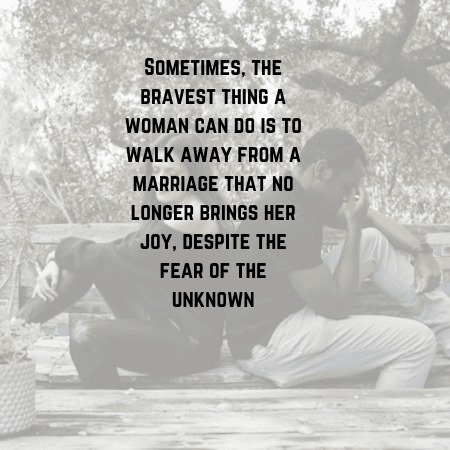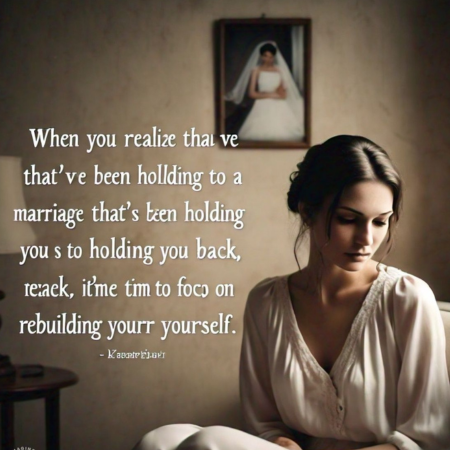Marriage, often seen as a lifelong commitment, can sometimes reach a breaking point where one or both partners contemplate giving up. When a woman reaches this stage, it’s a complex and emotional decision that can have significant implications for her and her family. In this article, we will discuss when a woman gives up on her marriage. So keep on reading…
When a woman gives up on her marriage, it’s not a sign of weakness, but a courageous act of self-love and self-preservation
Signs a Woman Might Be Giving Up on Her Marriage
When a woman might be giving up on her marriage, she shows certain signs that suggest she is feeling disconnected or unhappy. Here are some clear signs in simple words:
Less Communication: She stops talking much about her feelings or day-to-day things. Communication becomes very limited.
Avoids Spending Time Together: She might start to spend more time alone or with friends and family, avoiding shared activities that used to be common.
Shows Less Affection: The warmth in the relationship, like hugging, kissing, or holding hands, decreases. She might not show much interest in being close or intimate.
Doesn’t Argue Anymore: Surprisingly, if she stops arguing about things that used to bother her, it might mean she doesn’t see the point in engaging because she is feeling detached.
Seems Distracted or Disinterested: When together, she might seem lost in her thoughts or show little interest in conversations or plans.
Changes in Daily Routines: Significant changes in how she handles daily routines, like not caring much about joint schedules, could be a sign.
Talks About Future Without You: If she talks about her plans or future and you are not a part of those scenarios, it could be a sign she is moving away emotionally.
These signs, while not definitive, can indicate that a woman might be reconsidering her commitment to the marriage. It’s important for both partners to talk openly if such signs appear.

Reasons When A Woman Gives Up on Her Marriage
A woman might give up on her marriage for various reasons, reflecting deep-rooted issues or changes in their feelings and circumstances. Here are some common reasons:
Lack of Communication: When communication breaks down, misunderstandings and frustrations grow. Women might feel unheard or misunderstood, which can lead to feelings of loneliness and isolation within the marriage.
Emotional Disconnection: If a woman feels that the emotional bond with her partner is weakening, she may feel less connected to the relationship. This emotional drift can make her feel unsupported and alone, even when she’s not physically alone.
Infidelity: Being betrayed by a partner can be a devastating blow to a woman’s trust and love. This can often lead to the end of the relationship, especially if the trust cannot be rebuilt.
Lack of Appreciation or Respect: Feeling undervalued or disrespected can cause a woman to lose interest in continuing the marriage. Respect and appreciation are foundational to a healthy relationship.
Differing Life Goals or Values: Over time, individuals may evolve in ways that lead to divergent life goals or values. If a couple cannot reconcile these differences, it might lead to a decision to part ways.
Unresolved Conflicts: Continuous conflicts, especially when unresolved, can erode love and respect in a relationship. This can make the relationship feel more taxing than fulfilling.
Abuse: Any form of abuse—whether physical, emotional, or psychological—is a strong reason for someone to leave a marriage. Safety and well-being are fundamental.
Financial Issues: Constant stress about money can strain a marriage to the breaking point, especially if the couple has very different spending habits or financial goals.
Lack of Independence: If a woman feels she has lost her identity or independence within the marriage, she might seek to regain these aspects of her life by leaving the relationship
You May Find Helpful
- How to Stop Being Selfish in a Relationship
- Signs She Cheated And Feels Guilty Of Her Act
- How to Apologize for Cheating and Lying Letter
- How to End an Emotional Affair and Still Be Friends

What the Future: Assessing the Relationship
First, it’s essential to clearly understand what issues are causing the conflict or dissatisfaction. This involves open communication and often, deep honesty about what each partner is experiencing.
Partners need to consider whether they are fundamentally compatible in terms of values, goals, and lifestyles. This evaluation can determine whether issues are resolvable or too deep-seated.
Considering the Possibility of Reconciliation
Reconciliation requires that both partners are willing to make necessary changes. This might include compromises or seeking external help like counseling.
It’s important to reflect on the positives of the relationship and whether these outweigh the challenges. Sometimes, the emotional investment and shared history make reconciliation a valuable path.
Making Informed Decisions
Getting perspective from trusted friends, family, or professionals can provide new insights and help in making a balanced decision.
Decisions should take into account not just immediate feelings but the long-term well-being of both partners and other family members, especially children.
Self-Reflection and Personal Growth
This involves spending time alone to reflect on personal desires, goals, and areas of growth. Understanding oneself better can clarify what one needs from a relationship.
Whether the decision is to reconcile or move on, personal development is crucial. This might involve pursuing hobbies, education, or therapy to build a stronger sense of self.
Especially in long-term relationships, individuals might lose sight of who they are outside of their partnership. Rediscovering and affirming one’s identity can be empowering and is essential, irrespective of the relationship’s future.
Both reconciliation and moving on carry their own sets of challenges and opportunities. The process involves not just thoughtful consideration regarding the relationship but also a commitment to personal integrity and growth.
Making such decisions is never easy, but through careful reflection and honest assessment, one can choose a path that best supports their well-being and future happiness.
Conclusion
Deciding to give up on a marriage is a complex and deeply personal decision that can have profound implications for individuals and families. By recognizing the signs, understanding the reasons, and seeking support when needed, individuals can navigate this challenging process with resilience and grace. Whether choosing to reconcile or move on, prioritizing self-care and emotional well-being is essential in rebuilding a fulfilling life post-divorce.
